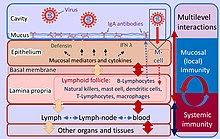John Mattick has a new book coming out in August where he defends the notion that most of our genome is full of genes for functonal noncoding RNAs. We have a pretty good idea what he's going to say. This is a talk he gave at Oxford on May 17, 2019.
Here are a few statements that should pique your interest.
- (0:57) He says that his upcoming book is tentatively titled "the misunderstandings of molecular biology."
- (1:11) He says that "the assumption has been very deeply embedded from the time of the lac operon on that genes equated to proteins."
- (2:30) There have been three "surprises" in molecuular biology: (1) introns, (2) eukaryotic genomes are full of 'selfish' DNA, and (3) "gene number does not scale with developmental complexity."
- (4:30) It is an unjustified assumption to assume that transposon-related seqences are junk and that leads to misinterpretation of neutral evolution.
- (6:00) The view that evolution of regulatory sequences is mostly responsible for developmental complexity (Evo-Devo) has never been justified.
- (8:45) A lot of obtuse theoretical discussion about how the number of regulatory protein-coding genes increases quadratically as the total number of protein-coding genes increase in a bacterial genome but at some point there has to be more protein-coding regulatory genes than total protein-coding genes so that limits the evolution of bacteria.
- (13:40) The proportion of noncoding DNA increases with developmental complexity, topping out at humans.
- (14:00) The vast majority of the genome in complex organisms is differentially transcribed in different cells and different tissues.
- (14:15) The whole genome is alive on both strands.
- (14:20) There are two possibilities: junk RNA or abundant functional transcripts and that explains complex organisms.
- Mattick then takes several minutes to document the fact that there are abundant transcripts— a fact that has been known for the better part of sixty years but he does not mention that. All of his statements carry the implicit assumption that these transcripts are functional.
- (20:20) He makes the boring, and largely irelevant, point that most disease-associated loci are located in noncoding regions (GWAS). He's responding to a critic who asked why, if these things (transcripts) are real, don't we see genetic evidence of it.
- (24:00) Noncoding RNAs have all of the characteristics of functional RNAs with an emphasis on the fact that their expression is often only detected in specific cell types.
- (31:50) It has now been shown that everything that protein transcription factors can do can be done by noncoding RNA.
- (32:15) "I want to say to you that conservation is totally misunderstood." Apparently, lack of conservation imputes nothing about function.
- (41:00) RNAs control phase separation. There's a whole other level of cell organization that we never dreamed of. (Ironically, he gives nucleoli as an example of something we never dreamed of.)
- (42:36) "This is called soft metaphysics, and it's just come into biology, and it's spectacular in its implications."
- (46:25) Almost every lncRNA is alternatively spliced in mice and humans.
- (46:30) There's more alternative splicing in human protein-coding genes than in mice protein-coding genes but the extra splicing in humans is mostly in the 5' untranslated region. (I'm sure it has nothing to do with the fact that tons more RNA-Seq experiments have been done on human tissues.) "We think this is due to the increased sophistication of the regulation of these genes for the evolution of cognition."
- (48:00) At least 20% of the human genome is evolutionarily conserved at the level of RNA structure and this does not require any assumptions.
- (55:00) The talk ends at 55 minutes. That's too bad because I'm sure Mattick had a dozen more slides explaining why all of those transcripts are functional, as opposed to the few selected examples he picked. I'm sure he also had a lot of data refuting all of the evidence in favor of junk DNA but he just ran out of time.
I don't know if there were questions but, if there were, I bet that none of them challenged Mattick's main thesis.


























